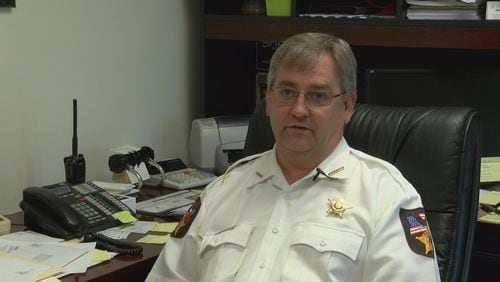Facing possible criminal indictment this week for ordering invasive body searches of an entire south Georgia high school, Worth County Sheriff Jeff Hobby had a choice: Step inside the grand jury room to defend his actions or let the chips fall where they may by remaining outside?
The stakes couldn't have been higher for a sheriff who has drawn national attention and been sued in federal court for allegedly violating the students' civil rights.
Hobby and five of his deputies faced allegations of sexual battery, false imprisonment and violation of their oaths of office in the bizarre drug search that left many students feeling sexually violated.
Georgia law allows law enforcement officers facing potential criminal charges a special privilege that regular citizens don't get: They can make a statement to grand jurors before they vote on whether to indict or not.
Facing mounting criticism from a public calling for more police accountability, state lawmakers last year changed the ground rules for officers who choose to speak to grand jurors on their own behalf.
Under the new rules, the officer doesn't get to sit in the grand jury room and listen to all the evidence before giving his statement. And now, instead of having the last word that can't be questioned or challenged by prosecutors or grand jurors, an officer or deputy who chooses to speak faces cross-examination.
Their words are made under oath and are put down in a transcript that eventually becomes public. So the stakes are much higher for a law enforcement official who chooses to speak in hopes of swaying grand jurors to his or her side.
The Worth County case is one of the first high-profile cases that has tested the new law.
As it turns out, the less-favorable rules seemed to factor into the sheriff's decision to not speak to grand jurors. Hobby nor any of the five deputies accused went before grand jurors even though they knew the potential felony charges if grand jurors voted to indict.
Grand jurors returned indictments Tuesday night against Hobby and two of his deputies. Hobby and the deputies face suspension of their law enforcement certification by the state as a result of the indictments.
Hobby's attorney, Norman Crowe Jr., said the new rules gave the sheriff pause as he considered whether to speak.
"You have no way to rebut any cross-examination," said Crowe. Crowe said the sheriff committed no crime and will be acquitted at trial where the rules are more balanced and jurors get to hear both sides.
Advocates for police accountability say that's exactly the point. As lawmakers debated the changes in 2016, advocates argued that officers should be treated like everyone else.
The grand jury process is the first step in a criminal proceeding and ordinary defendants do not get to make their case to grand jurors.
If someone is indicted, the case proceeds to criminal trial where both sides get to present evidence in open court before a trial jury.
While the revised grand jury rules still give law enforcement officials certain privileges that ordinary citizens do not receive, district attorneys across the state believe the process is more balanced than before, said Chuck Spahos, the executive director of the Prosecuting Attorneys' Council of Georgia.
Before the change officers could come in, say whatever they wanted without challenge and walk out, he said.
Officers still receive a copy of the indictment beforehand and have the right to give their statement, but the process is more balanced, Spahos said.
"It’s adding some meaningfulness to that," he said. "Rather than just being able to come in a make a closing argument."
He said the hearing transcript by a court reporter also creates a clear record that provides transparency afterward.
The debate in 2016 centered mostly around police shooting cases and followed an AJC/Channel 2 Action News investigation into the grand jury system that at the time had cleared every officer involved in a shooting.
Law enforcement officers no longer get to sit in the grand jury room for the entire process and hear all the evidence against them before having the final word.
Still, some police accountability advocates criticized the law when it passed and said it didn't go far enough. And it's an open question how many officers will forgo giving a statement in police shooting cases and whether it will have any meaningful effect on whether more officers will face criminal charges in shootings.
Spahos said the law is working as intended.
“The police officer is now treated like other witnesses," Spahos said. "That’s the balance we were after with the reforms.”
About the Author







